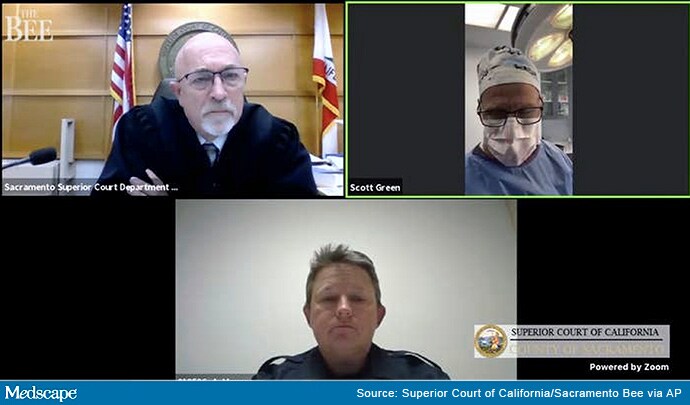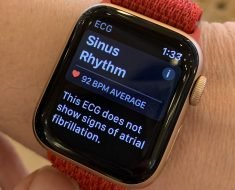
A Zoom video conference collage captured by The Sacramento Bee shows Scott Green, MD, who appeared virtually for his Sacramento Superior Court trial from an operating room.
A Sacramento, California, plastic surgeon under fire for attending a virtual court hearing while in the operating room is telling his side of the story, saying the incident has been blown out of proportion and that his patient was never at risk.
Since the video of the court hearing went viral, Scott Green, MD, says he’s been inaccurately portrayed in the media as an irresponsible physician who joined the virtual call as he was operating on a patient. An important fact missing from the narrative, says Green, is that his fellow, a licensed physician who has completed plastic surgery residency, was performing the closing of the facelift, and Green’s involvement was over. Green had been observing before the court called, but the fellow was completely capable of finishing the surgery alone, Green told Medscape.
“In hindsight, clearly it would have been better to step out and take the call out in the hall or the break room, but to be perfectly frank, I was a little befuddled,” said Green, 56. “I thought we’d be done, and I didn’t know what to do. The courtroom is not my comfort zone. I uncomfortably stood there trying to hear what they were saying because the Zoom kept cutting in and out. They evidently said, ‘This is going to be on YouTube,’ but I didn’t hear them say that.”
Green says he expected to be finished with procedures by the time he was due in virtual court on February 25. The traffic court gave a window of 3:00 PM to 5:00 PM for his Zoom hearing, and Green’s last surgery was scheduled for 1:00 PM.
But surgeries were moving more slowly than usual that day, he says. His final case was wrapping up when staff ran frantically into the operating room and announced that the hearing had started, Green said. The doctor emphasized that he had finished his portion of the procedure when he set his electronic device down in the operating room and entered the virtual hearing.
At no time was patient safety or patient privacy compromised, said his attorney, Jeffrey Segal, MD, JD.
“He’s a talented surgeon who is learning the rules of Zoom etiquette, but at no point in no way was patient safety or patient confidentiality at issue,” said Segal, CEO of Medical Justice, a company that offers medicolegal and reputation management services to physicians. “The patient was not identifiable, nor was the patient ever in harm’s way, or at risk for a suboptimal outcome.”
The patient had signed an authorization form allowing the surgery to be recorded and featured online for promotional purposes, Green said. Green has since spoken with the patient about the viral video and said she is supportive of Green and is pleased with her surgery results. The patient is not on social media.
Green says the video continued to cut in and out during the hearing, and he could not entirely hear what court officials were saying. The proceeding, which was livestreamed and was posted to YouTube, shows Green wearing scrubs, gloves, and a surgical cap with the operating room in the background. Another doctor can be seen working behind Green. During the call, Gary Link, a Sacramento Superior Court commissioner, told Green that he felt uncomfortable regarding the welfare of the patient and that he was postponing the hearing. The video has since led to harsh criticism from the public and media outlets, and some have accused Green of malpractice.
The aftermath has been a nightmare, Green said.
“I feel ill,” he said. “I feel ill that people want me dead without really knowing what happened. People are texting my family and saying awful things to them. I feel sad that someone would take things out of context and not understand the situation and blow it out of proportion.”
Since the media attention began, Green said he has received messages from people saying such things as, “Go kill yourself,” “You shouldn’t have a license,” and “You should be removed from this planet.”
To Segal’s knowledge, no formal complaints of any kind have been filed since the incident. A spokesman for the Medical Board of California wrote in an email to Medscape that the board was aware of the incident and would be looking into it. On March 2, Segal and Green preemptively sent a statement to the board explaining what happened and assuring it that neither patient safety nor patient confidentiality was ever compromised.
“This became a news story where the unanswered questions became conclusions that he was somehow in the middle of an important, dangerous part of the procedure and just cavalierly put the traffic ticket above the health and safety of his patient, which is just ridiculous and preposterous,” Segal said. “But without a counternarrative out there, that’s what happened on the internet.”
Segal says Green has learned a harsh lesson that the internet can be both wonderful and cruel at the same time, particularly when key details are missing from a story and strangers erroneously fill in the blanks.
“We’re just learning how to manage in a Zoom world,” Segal said. “Two years ago, if you had a traffic ticket, you had three choices. You could pay the ticket, you could hire an attorney to do your bidding, or you could burn half a day in traffic court and fight your case. That’s what the world looked like before. But because of COVID, we’ve been forced into an easier world in some ways where you don’t have to burn half a day. Now the court wants you to appear by Zoom. But this can be a double-edged sword because in our scheduled two-hour window of waiting, we likely will be doing something else when called to appear.”
Green acknowledges it was a bad idea to take the court’s call in the operating room. He attributes the faux pas to his unfamiliarity with technology.
“I have never been to traffic court before in my life and I don’t know anything about it, and I certainly have never been to traffic court on Zoom,” he said. “I don’t do Zoom or computers very well. I’m very old-fashioned that way. Our staff manages our Instagram account, I don’t.”
He believes it would help if the public was more educated about what happens during surgeries and the fact that physicians sometimes take a break from a case to go to the bathroom, discuss a biopsy with a pathologist, or review images with a radiologist.
“But they only take such breaks when it’s clearly safe for the patient,” he said.
As for Green’s traffic hearing, there will be no second Zoom call with the court anytime soon. Green went ahead and paid his speeding ticket.
“I just hope I can move forward, and that my practice can move forward,” said Green, who has practiced for 20 years. “Whether or not I was traveling 15 miles per hour over the posted limit was less important than getting the truth out, namely, that I take patient safety seriously and my patient was always safe.”
For more news, follow Medscape on Facebook, Twitter, Instagram, and YouTube and follow Alicia Gallegos onTwitter.
Source: Read Full Article





